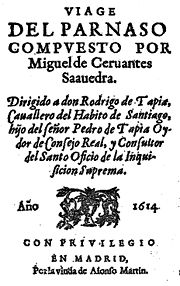
Viaje al Parnaso
Encyclopedia

Miguel de Cervantes
Miguel de Cervantes Saavedra was a Spanish novelist, poet, and playwright. His magnum opus, Don Quixote, considered the first modern novel, is a classic of Western literature, and is regarded amongst the best works of fiction ever written...
, generally rated as his second greatest work after the novel Don Quixote. It was first published in 1614 (see 1614 in poetry
1614 in poetry
Nationality words link to articles with information on the nation's poetry or literature .-Works published:-Great Britain:...
), two years before the author's death.
The chief object of the poem is to satirize those among the author's contemporaries who are false pretenders to the honours of the Spanish Parnassus. This satire is of a peculiar character: an effusion of sportive humour, leaving it a matter of doubt whether Cervantes intended to praise or to ridicule the individuals whom he points out as being particularly worthy of the favour of Apollo
Apollo
Apollo is one of the most important and complex of the Olympian deities in Greek and Roman mythology...
. He himself says: "Those whose names do not appear in this list may be just as well pleased as those who are mentioned in it." Cervantes' aims in composing the poem seem to have been to characterise true poetry according to his own poetic feelings, to manifest in a decided way his enthusiasm for the art even in his old age, and to hold up a mirror for the conviction of those who were only capable of making rhymes and inventing extravagances. Concealed satire and open jesting are the combined elements of this work.
The poem is divided into eight chapters, and the versification is in tercet
Tercet
A tercet is composed of three lines of poetry, forming a stanza or a complete poem. English-language haiku is an example of an unrhymed tercet poem...
s. The composition is half comic and half serious. After many humorous incidents, Mercury
Mercury (mythology)
Mercury was a messenger who wore winged sandals, and a god of trade, the son of Maia Maiestas and Jupiter in Roman mythology. His name is related to the Latin word merx , mercari , and merces...
appears to Cervantes (who is represented as travelling to Parnassus in the most miserable condition), saluting him with the title of the "Adam of poets". Mercury, after addressing to him many flattering compliments, conducts him to a ship entirely built of different kinds of verse, which is intended to convey a cargo of Spanish poets to the kingdom of Apollo. The description of the ship is a comic allegory. Mercury shows him a list of the poets with whom Apollo wishes to become acquainted and this list, owing to the problematic nature of its half ironical and half serious praises, has proved a stumbling block to commentators. In the midst of the reading, Cervantes suddenly drops the list. The poets are now described as crowding on board the ship in numbers as countless as drops of rain in a shower, or grains of sand on the seacoast; and such a tumult ensues, that, to save the ship from sinking by their pressure, the sirens raise a furious storm. The flights of imagination become more wild as the story advances. Thy storm subsides, and is succeeded by a shower of poets, that is to say poets fall from the clouds. One of the first who descends on the ship is Lope de Vega
Lope de Vega
Félix Arturo Lope de Vega y Carpio was a Spanish playwright and poet. He was one of the key figures in the Spanish Golden Century Baroque literature...
, on whom Cervantes seizes this opportunity of pronouncing an emphatic praise. The remainder of the poem, a complete analysis of which would occupy too much space, proceeds in the same spirit.
One of the pieces of verse written by Cervantes, is his description of the goddess Poesy, whom he sees in all her glory in the kingdom of Apollo. To this picture the portrait of the goddess Vain-Glory, who afterwards appears to the author in a dream, forms a companion. Among the passages, which for burlesque humour vie with Don Quixote is the description of a second storm, in which Neptune
Poseidon
Poseidon was the god of the sea, and, as "Earth-Shaker," of the earthquakes in Greek mythology. The name of the sea-god Nethuns in Etruscan was adopted in Latin for Neptune in Roman mythology: both were sea gods analogous to Poseidon...
vainly endeavours to plunge the poetasters to the bottom of the deep. Venus
Venus (mythology)
Venus is a Roman goddess principally associated with love, beauty, sex,sexual seduction and fertility, who played a key role in many Roman religious festivals and myths...
prevents them from sinking, by changing them into gourds and leather flasks. At length a formal battle is fought between the real poets and some of the poetasters.
The poem is interspersed throughout with singularly witty ideas; and only a few passages fail to live up to the general standard. It had no prototype. The language is classical throughout, but Cervantes added to the poem a comic supplement in prose, praising his own ability.
External links
- Viage al Parnaso by Miguel de Cervantes Saavedra at Project Gutenberg
- Frederick Bouterwek, History of Spanish Literature, Translator: ROSS, Thomasina, Edition: David Bogue, Fleet Street, London, 1847.

